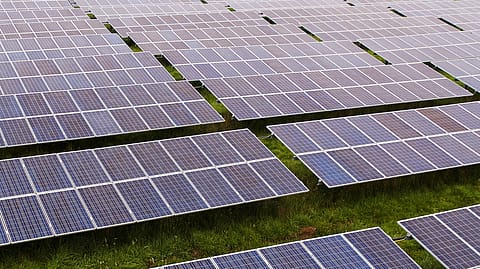ALMM is back; Centre pushes domestic solar production
This will boost domestic solar equipment manufacturing and India's pursuit to achieve self-sufficiency in the sector.

The Ministry of New and Renewable Energy (MNRE) has re-imposed the Approved List of Models and Manufacturers (ALMM) from April 1, boosting domestic solar equipment manufacturing and India's pursuit to achieve self-sufficiency in the sector.
India, which was dependent on China and countries like Vietnam for nearly 90% of the solar photovoltaic cells and modules due to lack of domestic manufacturing capacities until 3-4 years ago, imposed the ALMM in 2019 to promote sourcing the equipment from Indian manufacturers. However, the order was kept in abeyance for a year in 2023-24 to help many delayed projects, as its developers were reliant on Chinese equipment imports. Covid-19 and resultant delays then derailed many solar power projects, which were coming up as part of India's plan to have 500 gigawatts (GW) of renewable energy by 2030.
India's solar module manufacturing capacity, which was at 8 GW in 2022, was set to grow almost 400% to 38-43 GW in four years, ratings agency Crisil had predicted earlier. Global renewable energy tracking agency Mercom says India's cumulative solar module manufacturing capacity has reached 64.5 GW and solar cell manufacturing capacity has reached 5.8 GW by the end of December 2023. Following the Government's policy initiatives, India's module manufacturing capacity is expected to exceed 150GW and cell capacity to reach over 75 GW by 2026.
To boost domestic manufacturing, the government launched production Linked Incentive (PLI) in two tranches with an outlay of ₹24,000 crore. Under this PLI Scheme, Letters of Award were issued for setting up around 48.3 GW of fully or partially integrated solar PV module manufacturing capacity in the country.
The government recently updated the ALMM list with the addition of 3.5GW capacity and now the ALMM has 81 module manufacturers with a capacity of 37.4 GW. With the domestic manufacturing capacity now reaching 64.5 GW, the government will have to further add new manufacturers and models, say sources.
Sources say major suppliers in the Indian market were Chinese manufacturers and world leaders like Jinko Solar, Longi, Trina Solar etc. Indosol Solar, a special-purpose vehicle of Shirdi Sai, Reliance New Energy, First Solar, Waaree Energies, Avaada Ventures, ReNew Power, JSW Energy, Grew Energy, Vikram Solar, Amp Energy India, and Tata Power Solar were among the PLI-II tranche winners to set up module, PV and input units under various categories. In Tranch-1, the Adani Infrastructure, Shirdi Sai and Reliance New Energy had won 4GW each of integrated manufacturing capacity.